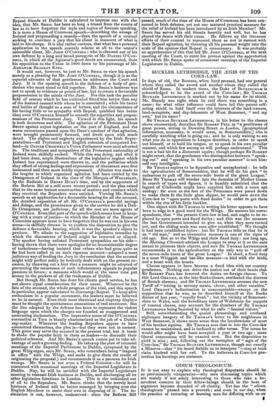BUCKLER LETHBRIDGE, THE /EGIS OF THE CORN-LAW.
In days of old, the Romans, when hard pressed, had one general whom they called the sword and another whom they called the shield of Rome. In modern times the Duke of BUCKINGHAM is acknowledged to be the sword Of the Corn-law ; Sir Tnorass BUCKLER LETHBRIDGE is marked out by his name for its shield. Mr. Shandy was right when he said there was something in a name; for what other influence could have led this patent self- acting shield to hold itself over the interests of the land-owners, land-occupiers, and day-labourers of West Somerset, "and my own," but its name ?
Sir THOMAS BUCKLER LETHBRIDGE, in his letter to the classes above enumerated, describes Sir ROBERT PEEL as "a gentleman of great power, sitting in Downing Street in London, [geographical information, necessary, it would seem, in Somersetshirej who is carefully watching what is going on ; and he is only waiting to see what you do in opposition to League doctrines, in order to speak out himself, or to hold his tongue, or to speak in his own peculiar manner, and which few among us will perhaps understand." This is not a bad hit for a Zumerzet squire; though perhaps Sir ROBERT might retort, that the gentleman who distinguishes between "speak- ing out" and "speaking in his own peculiar manner" is not him- self very intelligible.
Sir THOMAS aspires to be figurative and metaphorical : he tells the agriculturists of Somereetshire, that he will do his part "to endeavour to pull off the seven-mile boots of the great League." Since Sir THOMAS will wander into the domains of Mother Goose in search of types and figures, it is humbly submitted that the legend of Cinderella might have supplied him with a more apt analogy : for even as the feet of the Princesses were pared down to make them fit the little glass slipper, he would pare down the Corn-law to "open ports with fixed duties" in order to get them within the rim of his little buckler.
One object with Sir THOMAS in writing his letter appears to have been to edge in a good word for the Whigs. He assures his corre- spondents, that "the present Corn-law is bad, and ought to be re- placed by open ports and fixed duties ; and this was the measure the last Government intended to give us, when they were turned out, and the sliding scale was soon after established." We thought it had been established before : but Sir Thostes tells us that he is an "old man," and an irretentive memory is one of the signs of old age. But as to the Whigs and their fixed duty : not long ago, the Morning Chronicle advised the League to snap at it as the sure means to promote their objects, and now Sir THOMAS LETHBRIDGE recommends it to the agriculturists as the only way to "pull off the seven-mile boots of the great League." In short, a fixed duty is a most Whiggish and bat-like measure—a bird with the birds, and a beast with the beasts.
Cheese appears to have become a fixed idea with our country gentlemen. Nothing can drive the notion out of their heads that Sir ROBERT PEEL has lowered the duties on foreign cheese. To this Lord ORKNEY, at the late Bucks dinner, attributed the distress of Scotch cheeses; and Sir THOMAS LETHBRIDGE accuses the new Tariff of "letting in savoury meats, cheese, and other eatables." Lord ORKNEY'S hallucination is unaccountable—except on the supposition that he was, as he described himself at the Bucks dinner of last year, "royally fresh" ; but the vicinity of Somerset- shire to Wales, and the hereditary taste of Welshmen for suppers of toasted cheese, may account for the slumbers of Sir THOMAS LETHBRIDGE being haunted by what he calls "fancied visions."
Still, notwithstanding the quaint phraseology and confused nightmare imagery of Sir THOMAS'S letter to his neighbours in West Somerset, it shows more sense than the lucubrations of most of his brother squires. Sir THOMAS sees that in toto the Corn-law cannot be maintained, and is inclined to offer terms. The terms he would offer might have been accepted a year or two ago : more liberal concessions will be exacted now. But the disposition to yield is wise ; and, following out the metaphor of " mgis of the Corn-law," Sir Tnomas BUCKLER LETHBRIDGE, though not exactly a Minerva—that "his beard forbids us to interpret "—may at least claim kindred with her owl. To the believers in Corn-law pro- tection his hootings are ominous.


























 Previous page
Previous page